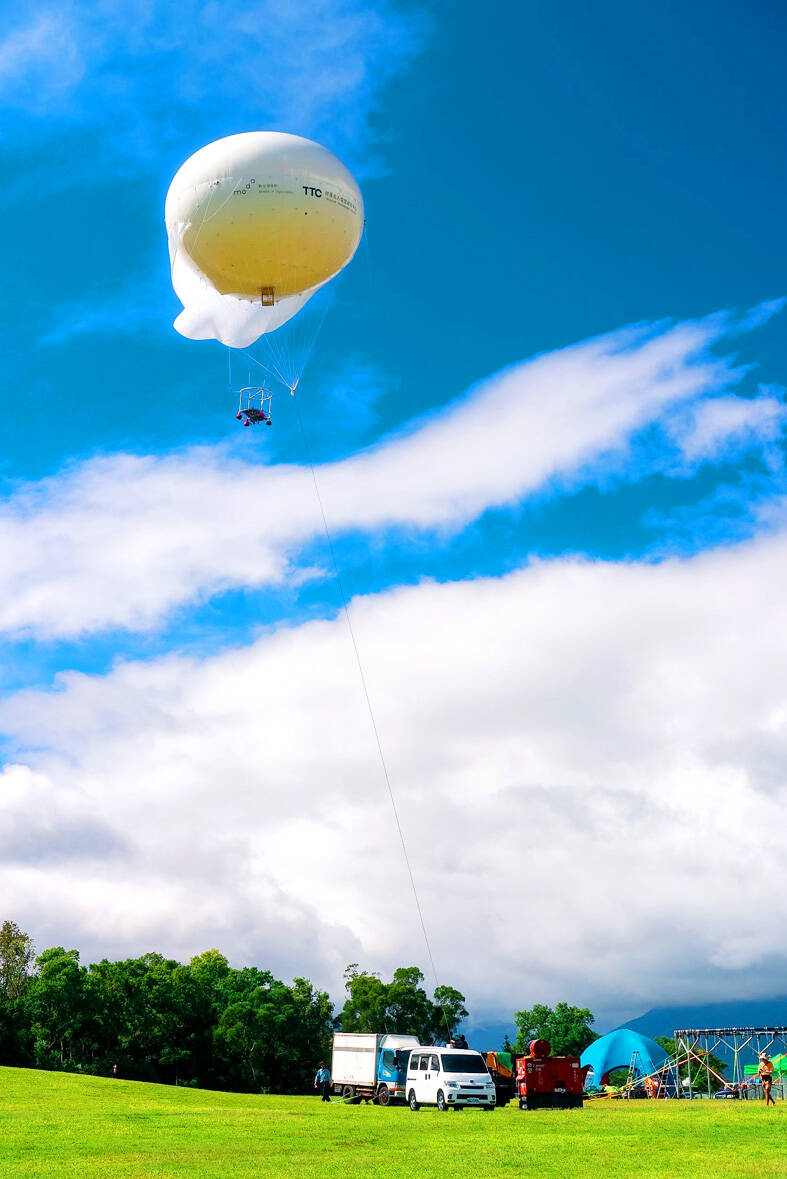The nation is developing a fleet of high-altitude balloons and drones to bolster Taiwan’s communications resiliency, the Ministry of Digital Affairs (MODA) said.
The high-altitude communications balloons and drones would serve as the backbone of an Internet network under the nation’s exclusive control, it said.
In October, Taiwan launched its first high-altitude communications balloon carrying hydrogen fuel cells and mobile base stations, MODA Department of Resource Management Director Niu Hsin-jen (牛信仁) told the Liberty Times (the Taipei Times’ sister paper) in a recent interview.

Photo courtesy of the Ministry of Digital Affairs
The program is a collaboration of the ministry, TH Aero Tech (天興航太), the Industrial Technology Research Institute, the National Taiwan University of Science and Technology, the National Taipei University of Science and Technology and the nation’s three main telecoms, Niu said.
The domestically developed and manufactured system is designed to control telecommunications networks across a 380km2 area during a military conflict or natural disaster, he said.
Balloons offer important advantages over other platforms, such as being inexpensive and easy to mass produce, making them resilient to attrition, he said.
Unlike satellite deployments that require negotiations with foreign governments on orbits and the usage of frequencies, balloons can use any frequency and be deployed at will within Taiwan’s airspace, he said.
The key technologies of the high-altitude balloons’ design and manufacturing are primarily sourced from the US, the UK, Japan and the Czech Republic, none of which pose a potential national security threat, Niu said.
Airships, balloons and drones are the main types of high-altitude station platforms that can be used for wireless communications, he said, adding that balloons were selected for their superior payload, loiter time and technological maturity.
The government did not develop airships due to the heavy energy consumption required for their deployment, Niu said.
The ministry is next year to increase the operational ceiling of balloons to 800m or higher, enable linkage between balloon-run networks to mimic the capability of satellite constellations and develop a drone-based platform station, he said.
The balloon-based, high-altitude platform station remains an experimental technology, but the potential for commercialization is substantial and could be achieved if a certification system is created, he said.

AIR SUPPORT: The Ministry of National Defense thanked the US for the delivery, adding that it was an indicator of the White House’s commitment to the Taiwan Relations Act Deputy Minister of National Defense Po Horng-huei (柏鴻輝) and Representative to the US Alexander Yui on Friday attended a delivery ceremony for the first of Taiwan’s long-awaited 66 F-16C/D Block 70 jets at a Lockheed Martin Corp factory in Greenville, South Carolina. “We are so proud to be the global home of the F-16 and to support Taiwan’s air defense capabilities,” US Representative William Timmons wrote on X, alongside a photograph of Taiwanese and US officials at the event. The F-16C/D Block 70 jets Taiwan ordered have the same capabilities as aircraft that had been upgraded to F-16Vs. The batch of Lockheed Martin

GRIDLOCK: The National Fire Agency’s Special Search and Rescue team is on standby to travel to the countries to help out with the rescue effort A powerful earthquake rocked Myanmar and neighboring Thailand yesterday, killing at least three people in Bangkok and burying dozens when a high-rise building under construction collapsed. Footage shared on social media from Myanmar’s second-largest city showed widespread destruction, raising fears that many were trapped under the rubble or killed. The magnitude 7.7 earthquake, with an epicenter near Mandalay in Myanmar, struck at midday and was followed by a strong magnitude 6.4 aftershock. The extent of death, injury and destruction — especially in Myanmar, which is embroiled in a civil war and where information is tightly controlled at the best of times —

China's military today said it began joint army, navy and rocket force exercises around Taiwan to "serve as a stern warning and powerful deterrent against Taiwanese independence," calling President William Lai (賴清德) a "parasite." The exercises come after Lai called Beijing a "foreign hostile force" last month. More than 10 Chinese military ships approached close to Taiwan's 24 nautical mile (44.4km) contiguous zone this morning and Taiwan sent its own warships to respond, two senior Taiwanese officials said. Taiwan has not yet detected any live fire by the Chinese military so far, one of the officials said. The drills took place after US Secretary

THUGGISH BEHAVIOR: Encouraging people to report independence supporters is another intimidation tactic that threatens cross-strait peace, the state department said China setting up an online system for reporting “Taiwanese independence” advocates is an “irresponsible and reprehensible” act, a US government spokesperson said on Friday. “China’s call for private individuals to report on alleged ‘persecution or suppression’ by supposed ‘Taiwan independence henchmen and accomplices’ is irresponsible and reprehensible,” an unnamed US Department of State spokesperson told the Central News Agency in an e-mail. The move is part of Beijing’s “intimidation campaign” against Taiwan and its supporters, and is “threatening free speech around the world, destabilizing the Indo-Pacific region, and deliberately eroding the cross-strait status quo,” the spokesperson said. The Chinese Communist Party’s “threats